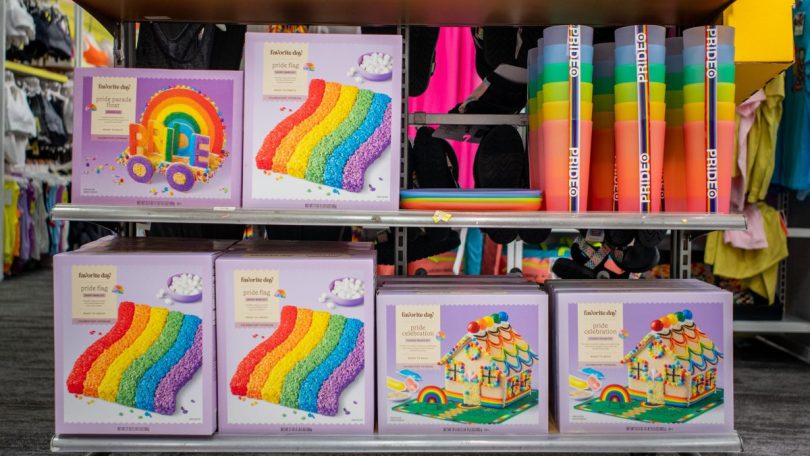In a 2024 Super Bowl ad, five-time NFL MVP Peyton Manning saunters up to a crowded bar with a rustic vibe — lots of cowboy hats and football jerseys. The bartender asks what he’s drinking.
“Two Bud Lights, please,” Manning says.
A hush falls over the crowd. A couple of burly, middle-aged guys give Manning the stink eye. “Actually,” he tells the bartender, “make it a round for the bar.”
Suddenly, the mood shifts. Manning tosses cans of Bud Light across the bar in perfect spirals. One patron makes a diving catch for the touchdown. The crowd erupts in cheers.
“In the bar, young men, sports: This is a very safe harbor for Bud Light,” said Tim Bennett, co-founder of the LGBTQ-focused marketing firm Tribury Productions.
In this ad, Bennett sees Bud Light reaching out to a familiar demographic. “Look, we haven’t left you. We’re still here. We get you. We know you,” Bennett said.
After 2023’s anti-trans Bud Light boycotts and all the ensuing drama for the brand, Bennett said it’s easy to forget how it started: with a brief and unremarkable collaboration with a transgender TikTok star.
“It was nothing. There was nothing controversial about it, right? It was just the fact that the person was trans, that’s all,” Bennett said.
But it made transphobic customers angry.Like, film yourself running over a bunch of Bud Lights with your SUV angry. As the controversy unfolded, Bennett said, the brand became toxic to broad swaths of the market. That included LGBTQ consumers, after Bud’s parent company, Anheuser-Busch, issued a quasi-apology and some retailers pulled the now-controversial beer from their menus and shelves. Anheuser-Busch, which continues to report weakened Bud Light sales, didn’t respond to an interview request from Marketplace.
Most companies say they’re not fazed by Bud Light’s misfortune. In a survey of 200 corporate marketing execs by Gravity Research, 78% reported making no changes to their Pride Month marketing plans after 2023’s backlash. Eighteen percent said the “threat of conservative consumer backlash” prompted them to change course. Nine percent reported the same regarding progressive consumers.
Still, expert observers like Bennett, who’s been watching the LGBTQ marketing scene since the 1990s, see companies pulling back and proceeding with caution.
“Whether you want to call it the Bud Light or the Target effect,” Bennett said, referencing the 2023 backlash over Target’s trans-inclusive Pride merchandise. “Something has happened.”
Which is not to say corporate America is abandoning LGBTQ consumers. Sure, brands may value diversity and want to be inclusive. But marketing to the LGBTQ community is also about making money.
“It’s a market that’s a trillion-dollar consumer base,” said Joanna Schwartz, a professor of marketing at Georgia College & State University who specializes in LGBTQ marketing.
That consumer base is growing as more young Americans identify as LGBTQ. Schwartz said that’s part of why we’ve seen a solid decade of loud corporate support during Pride Month.
“Putting a rainbow on something or donating some money to an LGBT-focused charity has been a way for companies to get an easy win,” Schwartz said.
That is, until transphobia became commonplace in right-wing politics. This Pride Month, Schwartz said, brands are looking to court LGBTQ-consumers and their allies without drawing homophobic and especially transphobic ire that could hurt their bottom lines.
“It is a fine line to walk,” Schwartz said. “You can create that impact around your brand without doing anything that others might perceive as risque or daring.”
Schwartz said not all companies are retreating. For example, Apple is holding steady with a trans-inclusive campaign. But after last year’s backlash, many companies appear to be avoiding trigger points for right-wing outrage.
After suffering a sales hit tied to its 2023 campaign, Target won’t sell Pride apparel for kids in 2024 and will stock only some of its stores with Pride displays and merchandise.
The North Face defended its 2022 and 2023 Pride partnerships with drag queen Pattie Gonia, but hasn’t resumed it. The outdoor brand’s 2024 Pride social media post offers nondescript support.
Skittles has retreated from 2023’s inclusive candy package designs that featured messages like “Black Trans Lives Matter” in favor of a standard, six-color rainbow promotion.
And for the first time since 2020, Calvin Klein’s Pride campaign won’t be headlined by any out trans or nonbinary models. Actors Jeremy Pope and Cara Delevingne front the collection.
None of the companies above responded to interview requests from Marketplace.
Pope and Delevingne “are both queer if you happen to know that,” said TJ Billard, who studies media and transgender politics at Northwestern University. But to the casual viewer, Billard said, the ad might not even come across as supporting Pride.
After a few years of companies hoping to stand out with progressive campaigns, Billard said mass Pride marketing has become quieter, more generic and less political. Meanwhile, algorithmsand influencer promotions enable brands to save the edgier stuff for a more targeted audience.
“Whether that’s TikTok or Instagram or whatever, queer people are going to see queer-supportive messages from these companies. It’s everyone else who’s not going to,” Billard said.
They said it’s “concerning” to see companies backing away in the face of anti-LGBTQ sentiment while a wave of conservative legislation seeks to block transgender Americans from accessing health care, public accommodations and legal recognition.
“It’s upsetting to an additional degree because it makes what was already a financial transaction-centered relationship [between corporations and] the queer community into something even more extractive,” Billard said.
Are brands alienating LGBTQ consumers? “Probably,” they said. But many seem to have made a decision: In this political climate, pushing back against homophobia, and especially transphobia, comes at too high a cost.
There’s a lot happening in the world. Through it all, Marketplace is here for you.
You rely on Marketplace to break down the world’s events and tell you how it affects you in a fact-based, approachable way. We rely on your financial support to keep making that possible.
Your donation today powers the independent journalism that you rely on. For just $5/month, you can help sustain Marketplace so we can keep reporting on the things that matter to you.







